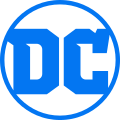National Comics Publications
| Formerly |
|
|---|---|
| Company type | Subsidiary[1] |
| Industry | Publishing |
| Predecessors |
|
| Founded | September 30, 1946 |
| Founder | |
| Defunct | 1977 |
| Fate | Rebranded as DC Comics in 1977 |
| Successor | DC Comics |
| Headquarters | New York City, U.S. |
| Products | Comic books |
| Parent |
|
National Comics Publications (NCP; later known as National Periodical Publications Inc. or simply National) was an American comic book publishing company. It was the direct predecessor of modern-day DC Comics.
History[edit]

The corporation was originally two companies: National Allied Publications Inc. (also known as National Allied Newspaper Syndicate Inc.[3]) which was founded by Malcolm Wheeler-Nicholson in 1935[4][5][6] to publish New Fun,[note 1] the first American comic book with all-original material rather than comic strip reprints, and Detective Comics Inc.,[5] which was founded on December 31, 1936[7] by Wheeler-Nicholson with Harry Donenfeld and Jack Liebowitz to publish Detective Comics.[8] Wheeler-Nicholson fell into deep debt to Donenfeld and Liebowitz, and in 1938, Donenfeld and Liebowitz petitioned Wheeler-Nicholson's National Allied into bankruptcy and seized it.[9][10]: 20
National Allied and Detective Comics Inc. merged to become National Comics Publications Inc.[11] on September 30, 1946,[12] absorbing Max Gaines' All-American Publications as well.[10]: 50 [13] National Comics was renamed "National Periodical Publications Inc." in 1961.[10]: 102 [14][15]
Despite the official names "National Comics" and "National Periodical Publications", the company began branding itself as "Superman-DC" in the early 1940s.[16]
In 1967, National Periodical Publications was purchased by Kinney National Services.[17] In 1977, the company changed its name to DC Comics.[18]
See also[edit]
Notes[edit]
- ^ The company debuted in 1935 with the tabloid-sized New Fun: The Big Comic Magazine #1 with a cover date of February 1935; New Fun #1 (Feb. 1935) at the Grand Comics Database. The entry notes that while the logo appears to be simply Fun, the indicia reads, "New FUN is published monthly at 49 West 45th Street, New York, N.Y., by National Allied Publications, Inc.; Malcolm Wheeler-Nicholson, President ... Inquiries concerning advertising should be addressed to the Advertising Manager, New FUN,...."
References[edit]
- ^ Gelder, Lawrence Van (February 4, 1971). "A Comics Magazine Defies Code Ban on Drug Stories". The New York Times. Retrieved September 18, 2018.
- ^ Jones, Gerard (2004). Men of Tomorrow: Geeks, Gangsters, and the Birth of the Comic Book. New York: Basic Books. ISBN 9780465036561.
- ^ Booker, M. Keith (2014). Comics Through Time: A History of Icons, Idols, and Ideas. Santa Barbara: Greenwood Press. p. 7. ISBN 978-0313397509.
- ^ Marx, Barry, Cavalieri, Joey and Hill, Thomas (w), Petruccio, Steven (a), Marx, Barry (ed). "Major Malcolm Wheeler-Nicholson: DC Founded" Fifty Who Made DC Great: 5 (1985), DC Comics
- ^ a b Goulart, Ron (1986). Ron Goulart's Great History of Comics Books. Contemporary Press. p. 55. ISBN 0-8092-5045-4.
- ^ Benton, Mike (1989). The Comic Book in America: An Illustrated History. Dallas, Texas: Taylor Publishing. pp. 17–18. ISBN 978-0-87833-659-3.
- ^ Twitter.com
- ^ Wallace, Daniel; Dolan, Hannah (2010). "1930s". DC Comics Year By Year A Visual Chronicle. London, United Kingdom: Dorling Kindersley. p. 17. ISBN 978-0-7566-6742-9.
The launch of Detective Comics defined [Malcolm] Wheeler-Nicholson's young comics company and set it on an ascendant path within the industry...His smart business decision to partner with businessmen Harry Donenfeld and Jack Liebowitz on Detective Comics guaranteed that his company's third title would at least be solvent.
- ^ Thomas, Roy (2000). All-Star Companion: An Historical and Speculative Overview of the Justice Society of America. Raleigh, North Carolina: TwoMorrows Publishing. p. 13. ISBN 1893905055.
By 1938 Major had faded into history...
- ^ a b c Cowsill, Alan (2014). DC Comics Year by Year: Updated Edition. London: Dorling Kindersley. ISBN 9780241015858.
- ^ Bridwell, E. Nelson (1972). Batman: From the 30s to the 70s. Feltham: Spring Books. p. 4. ISBN 0600313034.
- ^ "Young April 12, 1948 Findings of Facts". Scribd. Retrieved 11 December 2016.
DETECTIVE COMICS, INC. was a corporation duly organized and existing under the laws of the State of New York, and was one of the constituent corporations consolidated on September 30, 1946, into defendant NATIONAL COMICS PUBLICATIONS, INC.
- ^ Jones, Gerard (2004). Men of Tomorrow: Geeks, Gangsters and the Birth of the Comic Book. New York: Basic Books. p. 223. ISBN 0465036562.
- ^ Bart, Peter (September 23, 1962). "Advertising: Superman Faces New Hurdles; Publishers of Comic Books Showing a Decline Television Termed Chief Reason for Revenue Drop". The New York Times. Retrieved September 11, 2018.
- ^ Thompson, Maggie; Dean, Michael; Frankenhoff, Brent; Greenholdt, Joyce; Miller, John Jackson (1995). Comics Buyer's Guide 1996 Annual. Krause Publications. p. 81. ISBN 0873414063.
Beginning as National Allied Publications in 1935 [sic] and becoming National Allied Newspaper Syndicate the next year, it changed to National Comic [sic] Publications in 1946 and National Periodical Publications in 1961...
- ^ Eury, Michael (December 2002). Captain Action: The Original Super-Hero Action Figure. TwoMorrows Publishing. p. 46. ISBN 1893905179. Retrieved January 20, 2019.
- ^ "DC Comics". Don Markstein's Toonopedia. November 17, 2011. Retrieved August 10, 2012.
- ^ "DC Comics, Inc.: Private Company Information". Bloomberg. Retrieved 2016-08-06.
Further reading[edit]
- Charles Wooley (1986). Wooley's History of the Comic Book, 1899-1936: The Origin of the Superhero. Lake Buena Vista, Florida. 1986.
- DC Comics
- Comic book publishing companies of the United States
- Defunct comics and manga publishing companies
- Publishing companies disestablished in 1977
- Publishing companies established in 1935
- Publishing companies established in 1936
- Publishing companies established in 1946
- American companies established in 1935
- American companies established in 1936
- American companies established in 1946
- American companies disestablished in 1977

